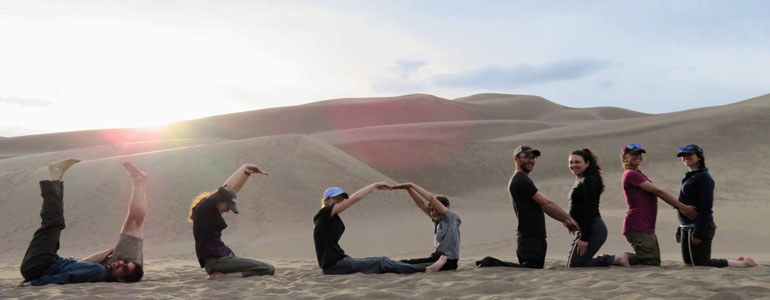
WHAT IS EARTH SCIENCES?
This major is part of the BEP Exploration Group
Earth Sciences undergraduate program website
Earth Science is the study of the Earth - its oceans, atmosphere, rivers and lakes, ice sheets and glaciers, soils, its complex surface, rocky interior, and metallic core. This includes many aspects of how living things, including humans, interact with the Earth. Earth Science has many tools and practices of its own but is intimately linked with the biological, chemical, and physical sciences.
Earth Science investigates the past, measures the present, and models the future behavior of our planet. But it also involves the study of other planets, asteroids, and solar systems, both to better understand the Earth and to expand our knowledge of the universe.
Earth Scientists study and work with minerals, soils, energy resources, fossils, oceans and freshwater, the atmosphere, weather, environmental chemistry and biology, natural hazards and more. They even study rocks on our moon and other planets in our solar system.
Examples of Earth Science jobs include: geologist, paleontologist, seismologist, meteorologist, volcanologist, hydrologist, oceanographer, and more!
The major in Earth Sciences is designed for students interested in the science of the Earth, with special emphasis on environmental change over geologic time scales, natural hazards, rocks and fossils, planetary science, paleoclimate variability, surface processes, mountain building, and the link between Earth’s physicochemical conditions and the evolution of life. Students may obtain a Bachelor of Arts degree or a Bachelor of Science degree.
https://www.americangeosciences.org/critical-issues/faq/what-is-geoscience
https://www.usgs.gov/scosciience-support/osqi/youth-education-science/what-geoscience
Declaration, Major Requirements, and Courses
HOW TO DECLARE:
---
MAJOR REQUIREMENTS:
---
HELPFUL INTRO COURSES:
Click here for full course description
ERTH 1010: Dinosaurs, Extinctions and Environmental Catastrophes
ERTH 1050 – Earth’s Dynamic Environment
ERTH 1051 – Earth’s Dynamic Environment
ERTH 1052 – Earth’s Dynamic Environment
ERTH 1055 – Geoscience and the American Landscape (Honors)
ERTH 1070: Natural Disasters and Environmental Change
